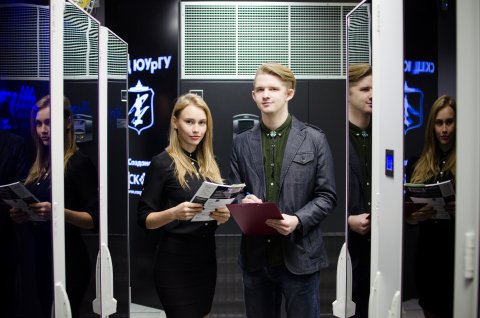The International Laboratory of Problem-Oriented Cloud Computing Environments opened in 2016 and supervised by Professor at the Centre for Scientific Research and Higher Education at Ensenada, Mexico, Andrei Tchernykh is dealing with breakthrough research in the fields of distributed computing and cloud technologies in order to meet the challenges of Industry 4.0 and Big Data.
The operation of the Laboratory created within Project 5-100 is targeted at solving problems relate to supercomputer calculations. The supervisor on behalf of South Ural State University, Gleb Radchenko, Director of the SUSU School of Electronic Engineering and Computer Science, shared on the work being carried out at the laboratory.

Photo: Director of the School of Electronic Engineering and Computer Science Gleb Radchenko
– What was the goal of creating the Laboratory of Problem-Oriented Environments at SUSU?
– As of today, cloud technologies have become integral part of both our professional activity and private life. The huge “cloud” potential, however, sets a number of tasks before the IT industry, starting from the issues of security of and control over the computational resources, and ending with the use of cloud technologies for solving of applied tasks. The main global challenge that the laboratory is facing is introduction of technology of the Industrial Internet of Things since currently there is an urgent need to unite multiple devices into a single network with the use of various communication channels. This allows obtaining and analysing big volumes of data.
– In what fields is the research being carried out?
– The laboratory carries out research in the following directions: planning of computational resources in the frameworks of cloud and fog computing mediums under conditions of uncertainty; research of cloud support systems of digital twins of production processes; research in the sphere of information security of distributed computing systems, cloud systems, systems of production process control; and application of cloud technology for support of “Smart Cities”.
– What kind of equipment allows to solve such complicated tasks?
– The work in the laboratory would not be possible without using the resources of the supercomputers installed at the SUSU Supercomputers Centre: Tornado SUSU, and SKIF-Aurora. The capacity of these supercomputers is at the level of the world’s leading computational systems. Tornado SUSU with its 29 184 processor cores is the most powerful supercomputer in the laboratory and is in the 8th place in the ranking of the supercomputers with the highest capacity in the CIS countries.
.jpg)
Photo: Professor at the Centre for Scientific Research and Higher Education at Ensenada, Mexico, and Head of the SUSU Laboratory of Problem-Oriented Cloud Computing Environments Andrei Tchernykh
– What foreign partners are participating in the fulfilment of the laboratory’s projects?
– The laboratory’s projects are being fulfilled in collaboration with the Centre for Scientific Research at Ensenada, Mexico; University of Klagenfurt, Austria; Lappeenranta-Lahti University of Technology, Finland; and with other partners from abroad. Such cooperation allows to achieve significant results and publish papers in highly rated scientific journals. From 2016 through 2019, the laboratory’s research fellows published 20 articles, one of which was included into ТОP-10% Scopus, and two more – into the first quartile journals.
– On June 1st, within the frameworks of the International Scientific Council, the results of work by the international research laboratories were presented. What recommendations were given by the SUSU ISC members to the Laboratory of Problem-Oriented Cloud Computing Environments on its development?
– In the course of the meeting of the International Scientific Council, President of Emerson corporation Michael Train highly praised the laboratory’s potential; he also proposed making these technologies more available for students in accordance with global trends. South Ural State University is actively working on creating such spaces for students, and already now there are different training laboratories functioning, where students are involved, and this field will be paid special attention to. And of course, we will continue working in the current fields of research, what will help SUSU become one of the world’s leaders in digitalization of education and industry.




